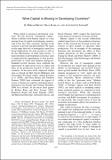What Capital Is Missing in Developing Countries?
Author(s)
Schoar, Antoinette; Bruhn, Miriam; Dean, Karlan
DownloadSchoar_What capital.pdf (84.59Kb)
PUBLISHER_POLICY
Publisher Policy
Article is made available in accordance with the publisher's policy and may be subject to US copyright law. Please refer to the publisher's site for terms of use.
Terms of use
Metadata
Show full item recordAbstract
What capital is missing in developing countries? We put forward “managerial capital,”
which is distinct from human capital, as a key missing form of capital in developing countries. And it has also been curiously missing in the research on growth and development. We argue in this paper that lack of managerial capital has
broad implications for firm growth as well as for the effectiveness of other input factors. A large literature in development economics aims to understand the impediments to firm growth, particularly in small and medium enterprises. Standard growth theories have explored the importance of input factors such as capital and labor in the production function of firms and countries. At the micro level, empirical studies
such as Suresh de Mel, David McKenzie and Christopher Woodruff (2008), Abhijit Banerjee
et al. (2009), and Dean Karlan and Jonathan Zinman (2009) have estimated the impact of
access to finance for capital constrained microenterprises (see Karlan and Jonathan Morduch, 2009, for a review). At the macro level, papers by Robert King and Ross Levine (1993), Raghuram Rajan and Luigi Zingales (1998), and Marianne Bertrand, Antoinette Schoar, and David Thesmar (2007) suggest the importance of the financial system for economic growth.
Date issued
2010-05Department
Sloan School of ManagementJournal
American Economic Review
Publisher
American Economic Association
Citation
Bruhn, Miriam, Dean Karlan, and Antoinette Schoar. “What Capital Is Missing in Developing Countries?” American Economic Review 100.2 (2010): 629–633.
Version: Final published version
ISSN
0002-8282
1944-7981